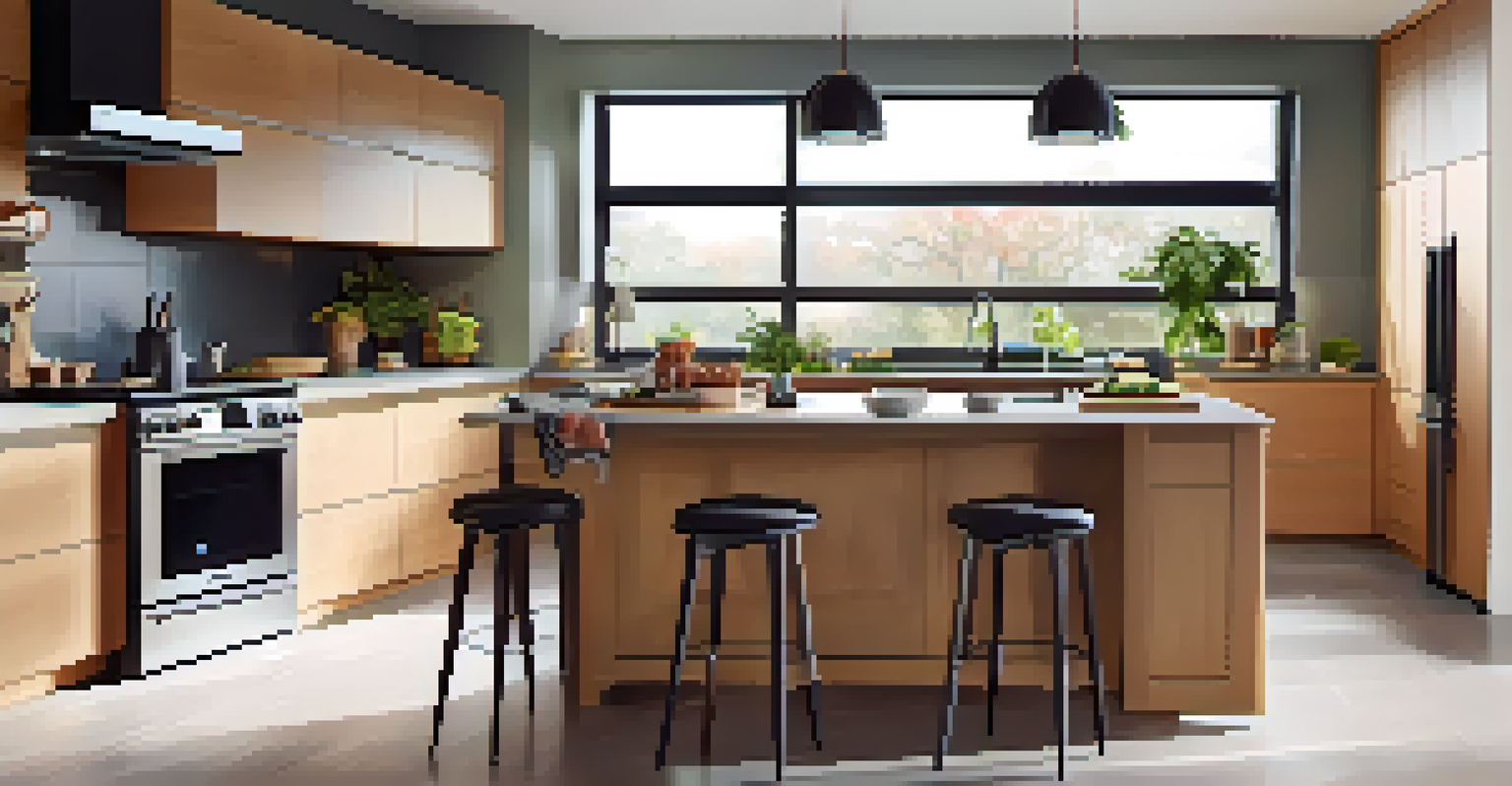The Rise of Smart Homes in the Remote Work Era

Understanding Smart Homes: A Brief Overview
Smart homes integrate technology to automate and control various household functions. From lighting to security systems, these devices are designed to make daily life easier and more efficient. Imagine being able to adjust your thermostat or turn on the lights with just your voice or a tap on your smartphone.
The home is a place where you can be yourself and feel comfortable, and smart technology can enhance that experience.
As technology advances, smart homes are becoming increasingly popular among homeowners. They offer convenience and can save energy, which is not just good for the environment but also for your wallet. With features like smart meters and energy-efficient appliances, homeowners can monitor and reduce their energy consumption.
In a world where remote work is becoming the norm, smart homes have the potential to create a more productive and comfortable work environment. By harnessing the power of connected devices, individuals can seamlessly blend their work and home life, allowing for greater flexibility and efficiency.
The Impact of Remote Work on Smart Home Adoption
The shift to remote work has accelerated the adoption of smart home technology. As people spend more time at home, they seek ways to enhance their living and working conditions. This desire for comfort and convenience has led to a surge in smart device sales, from smart speakers to automated lighting systems.

Many remote workers are now investing in smart home devices to create a more conducive work environment. For example, smart thermostats can help maintain an ideal temperature, while noise-canceling smart speakers can minimize distractions during work hours. These innovations enable a more focused and pleasant work experience.
Smart Homes Enhance Remote Work
Smart home technology improves comfort and efficiency for remote workers, blending work and home life seamlessly.
Moreover, the integration of smart home technologies allows for improved connectivity and communication. With devices like video doorbells and smart cameras, remote workers can stay connected with the outside world while maintaining security and peace of mind.
How Smart Homes Enhance Work-Life Balance
Smart homes play a crucial role in helping remote workers maintain a healthy work-life balance. By automating routine tasks, such as adjusting the lights or starting the coffee maker, individuals can save valuable time and energy. This frees up more time for personal activities and family interactions, which are essential for well-being.
Smart home technology is not just about convenience; it's about creating a sanctuary that supports your lifestyle.
Consider the example of a smart home system that syncs with your work calendar. It can set the lighting and temperature to your preferred settings automatically when it's time to start working. As your workday ends, the system can help transition back to relaxation mode, signaling the end of work and the beginning of personal time.
This ability to create distinct zones within the home—work and relaxation—can significantly reduce stress levels. When your home supports your work habits, it becomes easier to disconnect after hours, promoting a healthier lifestyle and improved productivity.
Smart Home Security: A Priority for Remote Workers
Security is a primary concern for remote workers, especially when they are home alone for extended periods. Smart home technology addresses this by offering advanced security features that can be monitored remotely. Devices such as smart locks, security cameras, and motion sensors provide peace of mind during long workdays.
For instance, a smart security system can send alerts to your smartphone if it detects unusual activity. This instant notification allows you to respond quickly, whether it’s checking in through a live camera feed or alerting authorities if necessary. Knowing that your home is secure lets you focus on work without constant worry.
Security Solutions for Remote Workers
Advanced security features in smart homes provide peace of mind for remote workers, ensuring safety while they focus on their tasks.
Furthermore, many smart home systems can be integrated with home automation features. This means you can simulate your presence at home by scheduling lights or playing music, deterring potential intruders and adding an extra layer of security.
The Role of AI in Smart Home Functionality
Artificial intelligence (AI) is at the heart of many smart home devices, significantly enhancing their functionality. AI can learn your habits and preferences over time, allowing devices to adapt to your lifestyle automatically. For example, a smart thermostat can learn your routine and adjust the temperature accordingly, ensuring comfort without manual input.
Moreover, AI-driven voice assistants can help streamline tasks throughout the day. By simply asking your assistant to set reminders, control your smart appliances, or check your schedule, you can optimize your time and stay organized while working from home.
As AI technology continues to evolve, we can expect even more sophisticated capabilities in smart homes. This will not only improve efficiency but also create a more intuitive and user-friendly experience that enhances remote work productivity.
Challenges and Considerations in Smart Home Adoption
While smart homes offer numerous benefits, there are also challenges to consider. One of the primary concerns is the cost of implementing smart technology. Although prices have decreased over the years, equipping an entire home with smart devices can still be a significant investment.
Another challenge is the potential for technical issues and the security of personal data. As with any technology, there is always a risk of malfunctions or breaches. It's essential for remote workers to choose reputable brands and stay informed about cybersecurity measures to protect their information.
AI Drives Smart Home Innovation
Artificial intelligence enhances smart home functionality, adapting to user preferences and improving productivity for those working from home.
Lastly, the learning curve associated with new technology can be daunting for some individuals. However, with user-friendly interfaces and comprehensive customer support, many people find that the initial effort pays off in convenience and efficiency over time.
The Future of Smart Homes in the Remote Work Landscape
Looking ahead, the future of smart homes in the remote work era appears bright. As technology continues to advance, we can anticipate even more innovative solutions that cater specifically to remote workers. This could include enhanced virtual collaboration tools and smarter home environments that adapt to individual work styles.
Additionally, as remote work becomes a permanent fixture for many, the demand for smart home technologies will likely grow. Companies may invest further in research and development to create devices that seamlessly integrate into the daily lives of remote workers, enhancing productivity and comfort.

Ultimately, smart homes are not just a trend; they represent a significant shift in how we live and work. By embracing this technology, remote workers can create an environment that supports their needs, leading to greater satisfaction and success in their professional and personal lives.